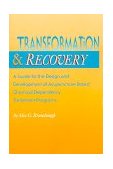Resources for Acupuncture in Chemical Dependency Treatment and Recovery

Won't adding "alternative medicine" such as acupuncture make our program seem experimental or "fringe" with our referral sources, funders, or potential clients?
The view that Oriental Medicine
and acupuncture are "alternative" is a largely North American
phenomenon. In most European countries - and certainly in China (which
has fully integrated Western medicine) these "Eastern" therapies
are viewed as complementary; they are not an "alternative"
to anything.
And this is the view that appropriately governs the use of acupuncture in the alcohol and other drug treatment setting. Acupuncture should be viewed as an added tool to assist and support clients in their recovery, and should never be viewed as an alternative to conventional treatment modalities. This is the stance that the program should take in its outreach, grantwriting, and public relations policies. The fact that CSAT has undertaken to publish a TIP on acupuncture lends mainstream legitimacy to this view.
The greatest support for acupuncture in addiction treatment has come from the criminal justice community, particularly with the establishment of acupuncture as an integral part of the original drug court program in Miami in 1989 (see article), and in subsequent successful drug court venues throughout the country. This is largely because criminal justice practitioners are witness to the high rates of relapse among chronic addicts and alcoholics, and are very practical about any strategies that might help.
In North America, resistance to Chinese medicine in general comes mostly from the Western medical community. But resistance to acupuncture in the treatment of addiction treatment can be easily answered by the extensive Western research on acupuncture's efficacy in treating pain. Much of this "beta endorfin" research has been conducted with animals, dispelling the theory that acupuncture is a "panacea." The resistance of many physicians - particularly those who are familiar with addiction - is further softened by their knowledge about the great challenges in treating the chronic relapsing disease of addiction. The most cynical reaction is often the ironic one, "Well, it probably won't hurt."
One surprising (though increasingly small) pocket of resistance to this work comes from the Chinese medical community itself. Click here for a perspective on these concerns and issues.
previous
- Read FAQs in Sequence - next
Index of Articles - Links - Home
Scroll down for more FAQs
How many clients can be treated at once?
How often do clients need to be treated?
How long to clients have to keep having treatments?
Does it matter what time of day the acupuncture is provided?
What
national organizations support acupuncture in treating addiction? What
resources are available to support us if we decide to do it?
Does
the acupuncture program have to include herbs or nutritional supplements?
What
is the history of how acupuncture began to be used in chemical dependency
treatment?
What
does the acupuncture clinic look like exactly?
How
much space and extra equipment will we need to do it?
How
do we clean or dispose of the needles after they are used?
How
does acupuncture fit with drug testing?
How
do we find and train people to do the needling?
Could
we just try it experimentally to make sure it's a good fit for us?
What
technical assistance will be required to start and maintain an acupuncture
component?
Is
it compatible with harm reduction?
Is
it compatible with 12-Step or abstinence-based treatment approaches?
Is
it appropriate for mandated or court-referred clients?
Is
it appropriate for adolescents?
Is
it appropriate for pregnant women?
Is
it appropriate for people with co-morbid psychiatric problems?
Is
it appropriate for people with HIV/AIDS?
Is
it appropriate in methadone programs?
Is
it appropriate in residential programs?
What
training is required for current program and administrative staff?
What are the steps we should take to add an acupuncture component?